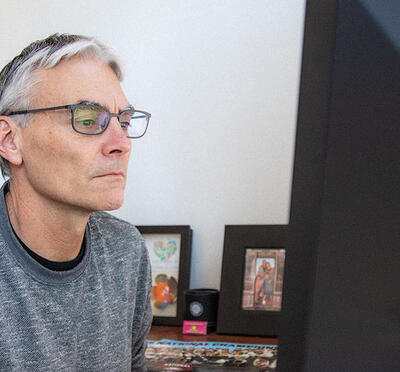Tianyi Chen joins the faculty of the College of Engineering’s School of Nuclear Science and Engineering this fall as an assistant professor.
Chen brings recent national laboratory experience and expertise in nuclear materials. Before coming to Oregon State, Chen was performing postdoctoral research at Oak Ridge National Laboratory, where he worked on projects sponsored by the Department of Energy. These projects looked into radiation-induced changes in the microstructure and mechanical properties of advanced alloys.
The need for new and better nuclear materials is the most critical problem for nuclear engineers to tackle today, Chen says.
“We have been using nuclear power for more than 50 years, but a considerable amount of the materials used in nuclear reactors were the same materials that were designed for fossil fuel reactors,” Chen said. “Unfortunately, these materials are not up to the task, especially with demand for greater efficiency in fuel and economics. They are prone to failure, sometimes with catastrophic results.”
Radiation damage is a key contributor to this failure, Chen says. Reactor materials are continuously bombarded with high-energy neutrons. While the energy isn’t high enough to break atoms apart, the neutron strikes are strong enough to knock individual atoms out of position, disrupting the crystalline structure of the material and undermining the foundation of its strength. Chen compares it to the action of the balls on a billiards table: One single neutron can hit with enough force to disrupt the location of several atoms.
But that’s just one part of the problem.
“Most nuclear materials are alloys,” Chen says. “So with this constant bombardment, some elements may become segregated. You go from having a more or less homogeneous material to one with segregated elements, and this fundamentally alters the properties of the material.”
There’s no one reason why nuclear materials fail, Chen says. Rather, it’s a synergistic effect – a combination of radiation damage, prolonged exposure to very high temperatures (the annealing effect), and chemical damage from an extremely corrosive environment. Understanding that is only part of the battle.
“My research is directed toward not only determining why these materials fail, but more critically, in creating new and better materials for nuclear reactors,” he said. “Since a lot of this damage happens at the atomic level, I am working to design new materials from the atomic scale.”
One area Chen is particularly interested in involves incorporating nanoscale material into the alloys. These engineered microstructures fortify the structure of the material, helping to protect it from neutron strikes.
Chen discovered his interest in nuclear materials as he was working to complete his undergraduate degree in physics at China’s top science school, Peking University.
“I was quite into science, but I wasn’t sure how the study was contributing to society,” Chen said. “At the time, we were using ultra-high-energy particles to bombard materials. The energy is so high that it can break up a single atom into protons and neutrons. There’s a knowledge gap there, but it’s not of much practical use yet.”
When it came time to choose a major for his graduate degree, Chen says he didn’t want to abandon science, but he wanted to find an area of study that he knew could yield real, tangible benefits for humanity. He settled on nuclear engineering as a way to put his physics knowledge to good use, helping to solve critical, present-day problems related to meeting the world’s energy needs.
Chen went to Texas A&M University to earn his doctorate in nuclear engineering, working in the Nuclear Materials and Fuel Cycles group. While in graduate school, Tianyi spent time working at both Idaho National Laboratory and Argonne National Laboratory, where he was introduced to some of the world’s most advanced facilities and some of the best researchers in the field.
“That experience helped me to get a better and better idea of what is the critical problem in nuclear engineering,” Chen says. “I chose materials for that reason, and it happens to suit my background and interests best. The triumphs of materials science rest on a physics foundation. And I’m tackling nuclear energy challenges with the cutting edge of materials science.”


